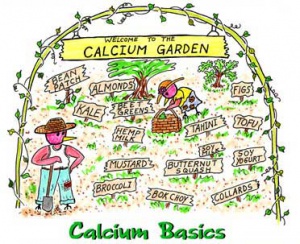Calcium
Contents
Description
Calcium is the most abundant element in mass on Earth, has the chemical element symbol Ca and is a soft grey alkaline earth metal. It is the fifth most abundant dissolved ion in ocean water by mass and molarity. Essential for living organisms, calcium plays a large role in the physiology of cells and signals a variety of cellular functions such as the mineralization of bones and shells in animals and humans. Known even since the Ancient Roman times, calcium was not isolated until 1808 in England by Sir Humphry Davy through the mixture of lime and mercuric oxide. Largely important for a healthy diet, calcium is a necessary mineral for humans as it plays an essential role in the formation of bones and teeth, muscle contraction and neurotransmitter release. Vitamin D is essential for the absorption of calcium.
Health Benefits
There are a variety of benefits associated with a healthy intake of calcium including optimum bone and teeth growth and condition, prevention and treatment of osteoporosis, blood pressure management and hypertension, kidney stones, weight loss and maintenance and the prevention and/or treatments of various cancers including colon and prostate cancer. Other illnesses and conditions that can be treated or prevented with a proper intake of calcium are normal blood clotting, the proper functioning of muscles and nerves, blood vessel contraction and dilation and is essential to various other metabolic processes in the body.
Beauty Benefits
While most may not see this as a beauty benefit, it is beneficial for women; healthy intake of calcium regulates your menstrual period and can even ease the symptoms of PMS such as cramps, mood swings and bloating. It is most known that calcium builds healthy bones and teeth so you can show off your pearly strong white teeth with proper levels of calcium in your diet. Calcium also helps to fight food cravings and can help you maintain a healthy weight. Calcium helps to maintain strong, healthy nails and prevent them from becoming dry or brittle. It also regulates your sleep cycle as it has a relaxing and calming effect on the body.
This ensures you get a good night's sleep and proper beauty rest to minimize wrinkles and other skin issues such as acne and maximize your most beautiful qualities such as smooth, clear skin and shiny strong teeth and nails.
Food Sources
- Milk & Cheese
- Kelp & Wakame Seaweed
- Almond & Sesame Seeds
- Beans
- Oranges
- Papaya
- Arugula
- Parsley
- Sweet Potatoes
- Goji berries
- Cucumbers
- Celery
- Yogurt
- Tofu
- Salmon
- Spinach
- Whole Wheat Bread
- Collard Greens
- Okra
- Kale
- Broccoli
- Soy Milk
Daily Dose Recommendations
- 0-6 Months: 210 Mg/Day
- 7-12 Months: 270 Mg/Day
- 1-3 Years: 500 Mg/Day
- 4-8 Years: 800 Mg/Day
- 9-18 Years: 1,300 Mg/Day
- 19-50 Years: 1,000 Mg/Day
- 51+ Years: 1,200 Mg/Day
It is recommended that no more than 600 Mg in supplement be taken at a time as the absorption of calcium will decrease as the amount goes up. Therefore, calcium supplements should be taken throughout the day in small doses.
Deficiency
Calcium deficiency seems to show no obvious symptoms short terms, but over time, hypocalcemia usually is a result of this deficiency. Symptoms of hypocalcemia include muscle cramps, loss of appetite, abnormal heart beat and numbness in the hands and fingers. A deficiency in calcium can cause rickets, poor blood clotting, osteoporosis, impaired kidney functions, hyercalcemia and in some cases, decreased absorption of various minerals. In worst cases, a calcium deficiency that is left untreated can cause death. Those who are most at risk to develop this kind of deficiency include postmenopausal women, those who are lactose intolerant, vegetarians, female athletes and amenorrheic women.
Related Discussions
- Best form of Calcium and Magnesium?
- Sleep, muscle tics / restless legs / etc -- calcium?
- Calcium supplementation causes heart attacks
- Cabbage Juice calcium content
